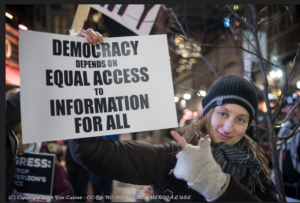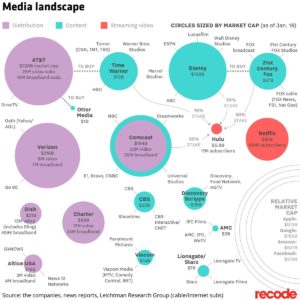
Photo: Tim Carter
A federal court judge approved the $85 billion bid by AT &T of Time – Warner, creating a huge vertically integrated media giant. The judge found no need for the kind of conditions placed on the Comcast acquisition of NBC Universal in 2011, or ensuring a free press. Though both cases are quite similar in that AT & T and Comcast are both major media companies acquiring content providers and news organizations (NBC, and CNN). In approving the Comcast – NBC bid, the judge laid out detailed conditions to protect consumers, requiring adherence to net neutrality for Internet supported content providers and assistance for low income users. Since the Comcast – NBC merger Comcast has violated several provisions of the agreement as outlined by former FCC commissioner Mignon Clyburn and Senator Richard Blumenthal including: not adhering to network neutrality in providing channels to consumers, slow implementation of low income Internet assistance programs, not providing smaller cable channels with fair rates to access regional sports networks and discriminated against Bloomberg Television (a competitor of CNBC). Clyburn and Blumenthal in their op-ed piece pose three key questions to be answered in every major merger (our answer):
- How will consumers be affected? Negatively by lack of competition
- What will this do to competition in the industry? Reduce competition significantly
- What will it mean for small businesses? Small businesses will be squeezed out of the market
For some reason, the court in the AT & T – Time Warner case did not seem interested in answering these questions related to safeguarding consumers, businesses or freedom of the press. Federal regulators found in the Comcast – NBC bid the need for 150 conditions to be placed on the merged corporate organization.
Today, the court saw a need for no conditions? Why? When we have a deregulation federal government policy wave rolling across the country today it is even more imperative that conditions be in place if these giant mergers are to be approved.
Next steps:
Our position is the merger juggernaut needs to be stopped now, and this merger not approved – later we will have to break it up anyway. Mergers contribute to lack of jobs as well which hurt wage gains by workers. Media concentration limits access to information and choices for media coverage. In 1983, 90 % of media, entertainment and distribution markets were controlled by 50 companies, today, there are 6 major players:

By approving the AT &T – Time-Warmer deal the court is giving a green light to deals now under review like the Disney bid (Comcast biding too) for 21st Century media which would create yet another huge conglomerate strangling competition and reducing the number of news sources. Other major Internet players are waiting in the wings like Apple, Google, Amazon and Facebook who are flush with cash and looking to control both the Internet, broadcast and film content and distribution.
We have said that deals like this need to be reviewed in supporting the common good ensured by freedom of the press. This AT &T deal should not be approved on media concentration and press limitation grounds. Jefferson and Madison observed correctly that a democracy can not long survive without a well-informed citizenry making decisions based on multiple points of view. Major corporations win in deals like the AT &T – Time Warner merger, the American citizen loses.
